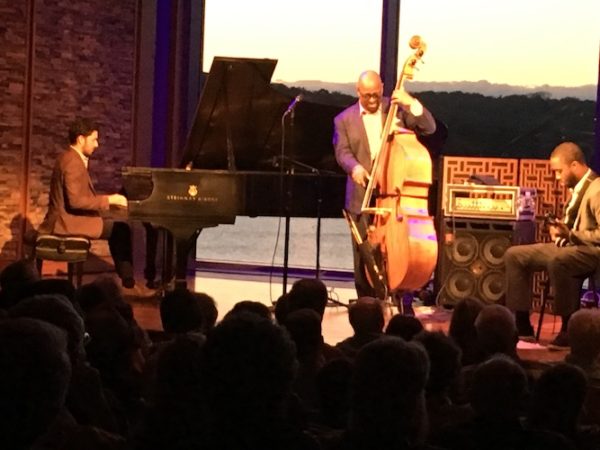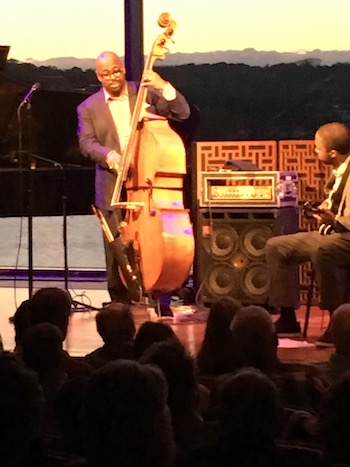Jazz Concert Review: Christian McBride & Tip City — Mastery and Joy
By Steve Provizer
It’s an uncommon pleasure to see band members enjoy themselves the way Tip City did.

Christian McBride & Tip City (pianist Emmet Cohen and guitarist Dan Wilson) at the Shalin Liu Performance Center. Photo: Steve Provizer.
Every once in a while, someone like Christian McBride percolates up in the jazz world. These folks proffer a rare combination of instrumental and/or compositional skill, a charismatic musical vision, an ability to gather (and inspire) other musicians, and a winning way with an audience. It used to be be that members of this breed led big bands, each group associated with a specific style. Take Fletcher Henderson, Jimmie Lunceford, John Kirby, and Gerry Mulligan as examples. A few, like Duke Ellington and Artie Shaw’s groups, pushed into more eclectic territory.
However, in the last 30 or so years, a new generation of leaders have shifted the old paradigm. Musicians like David Murray, Anthony Braxton, Roy Hargrove, Dave Holland, Vijay Iyer, and others lead groups, large and small, that perform widely varying styles, including bop, free, fusion, electronic, hip-hop, and World Music. Because the definition of “jazz” has expanded, so has the repertoire of these “new leaders.” In fact, one might well shift my argument into reverse: these leaders have stretched our definition of jazz. McBride is a key member of this adventurous cohort.
Philadelphian McBride, born in 1972, gigged as a teenager and then became widely known in the early ’90s as part of the second wave of so-called “young lions.” Mentored by bass master Ray Brown, he played acoustic and electric bass and soon began performing with some of the best jazz musicians of several generations. He’s recorded 15 records as a leader and hundreds as a sideman. McBride has also distinguished himself as a jazz educator / advocate. He has composed in both short and long forms and is a frequent guest soloist with various big bands.
On June 7 at the Shalin Liu Performance Center I caught the protean McBride in one of his many incarnations, a trio called Tip City, which includes pianist Emmet Cohen and guitarist Dan Wilson. These musicians are masters of their instruments. They have been playing as a unit on and off for four year and have an obvious respect for and love of each other’s playing. This creates the foundation for a high level of infectious communication — with each other and with audience members — that made for a marvelous evening of music. I left the gig with a sense of uplift that I seldom experience from a concert.
The group started with a tune that once might have been called “soul-jazz”: “F.S.R. (For Sonny Rollins).” McBride told a funny story about how Ray Brown took most of the melody and chords from Rollins’s tune “Doxy” and altered it slightly so he’d get the royalties instead of Rollins. So, “f— Sonny Rollins.” Right from the get-go, each member of the group showed that he had all the chops necessary to pursue any direction that was desired. Wilson had what I would call a “throaty” guitar sound — less round than one often hears in jazz guitars — that suited this tune particularly well. He motored up and down the fretboard with alacrity. Cohen came out of the gate playfully, Monk-ish touches giving way to full and intense coverage of the keyboard. McBride was a wonder on the bass, moving from fast, virtuosic lines back to flashes of funk that grounded the solo in the spirit of the tune. Guitar and piano traded 8’s and 4’s and they brought it home.
The next tune was a “late” standard (1974) “I’m Afraid the Masquerade is Over.” All three solos worked well; it became increasingly evident that, as we moved into the evening, the group members were beginning to playfully get inside each other’s skin more and more. They were testing the harmonic waters to see if the others would follow, curious about how others would respond. McBride is not particularly interested in quoting from other tunes, though I did hear him play a brief snippet from a sea chantey — I forget the name. The trio took off into a funky vamp and McBride back-announced the tunes, showing off his skill at creating a bond with the listeners.
Up next was the ballad “In the Wee Small Hours,” made famous by Frank Sinatra. This number featured Wilson; his extended introduction was just a shade below the high level of quality attained by the rest of the evening. There was an inconsistency in his attack; his sound didn’t serve the tune that well. There followed a beautiful, melodic bowed solo by McBride. It was revealing that when Wilson came back to close the piece, his playing was much more compelling; it seemed as if he had been listening carefully to the others and had successfully assimilated their work in his own playing.

Christian McBride at the Shalin Liu Performance Center. Photo: Steve Provizer
After intermission, Tip City returned with a medium blues. All I can say is there was all kinda shit happening. Each soloist drew on an enormous compendium of choices and each rocked the house. Cohen was especially riveting; he searched through his blues “memory palace” and came up with new approaches, fresh things to say. The energy was crackling; McBride felt it, and urged the audience to clap, which it did, in a fast minute. When the performance ended, and the cheering stopped, McBride deftly educated the almost completely white audience on the issue of clapping on 2 and 4, not 1 and 3. “You don’t want to propel the myth…”
The genre changed with the next tune, “Cravo e Canela,” which is by the Brazilian composer Milton Nascimento. A tune in 6/8 time with subtle subdivisions, the selection provided a nice shift in atmosphere. Cohen attacked his solo full bore. There was no bass solo, but McBride had plenty to do, given that he was charged with keeping the clave going throughout the tune. If you’re not gonna have a drummer, McBride’s your man for maintaining a rolling rhythm.
McBride pulled out all the (double) stops, drawing on strumming and bass techniques, in his lengthy introduction to the next tune, Duke Ellington’s “Sophisticated Lady.” Wilson soloed well and McBride provided a bowed solo that stuck pretty close to the melody. They closed the tune with an elaborate coda. The group fully explored the song’s rich harmony.
The last (pre-encore) tune was an original by Cohen called “You Already Knew.” It’s a fairly intricate, medium up-tempo composition that sticks pretty much to minor in the A section, goes to major in a bridge, and has a brief transitional section that uses a pedal tone. During each section there are stop times and tricky unison ensemble phrases that added interest. Each soloist clearly knew the tune well, and was able to release the energy called for in any given section — while being able to hit his ensemble marks when necessary. Traded 8’s and 4’s led to the closing statement of the melody. Only musicians capable of great technical skill could find so much expressive freedom in such a dense structure.
The crowd demanded and got the trio back onstage for an encore: “Billy Boy,” a traditional tune that was resurrected in the ’50s by the likes of Ahmad Jamal, Miles Davis, and Red Garland. Tip City took the song at a blistering tempo; the solos were commensurately virtuosic. In possible homage to the celebrated bassist Paul Chambers, McBride played a dazzling bowed solo that danced up and down the fretboard.
It’s an uncommon pleasure to see band members enjoy themselves the way Tip City did. They seem to truly dig each other’s playing, employing enormous concentration, especially during solos, but always carefully watching and listening to the other members of the group, often — especially in McBride’s case — with big smiles. To me, this is the way music like this should be created and presented — with mastery and joy.
Steve Provizer writes on a range of subject, most often the arts. He is a musician and blogs about jazz here.
